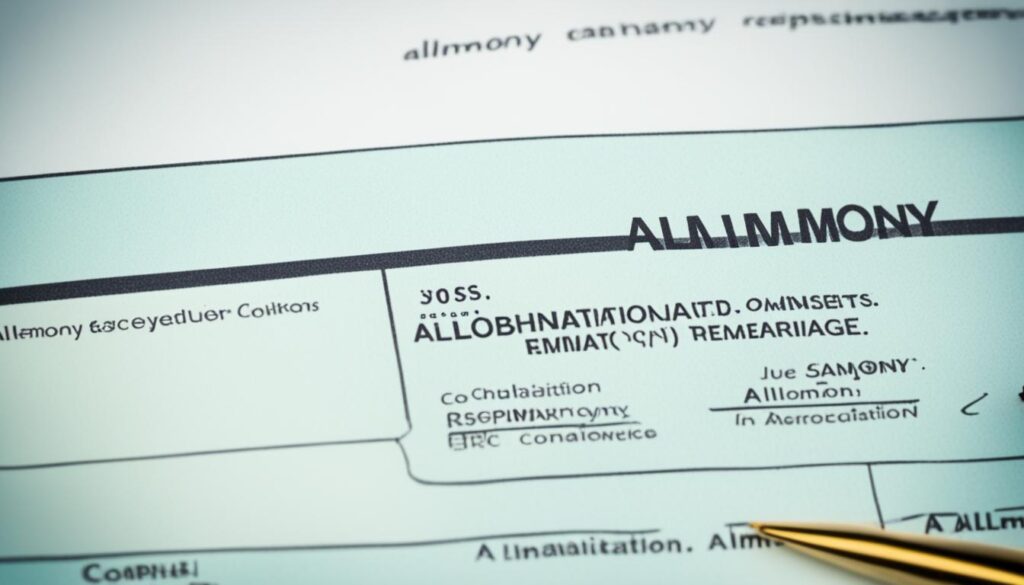Have you ever wondered how in New Jersey, significant changes can lead to the termination of alimony payments? That’s right! Unexpected events can disrupt the financial arrangements between former partners. It is crucial for individuals going through a divorce or considering modifying their alimony agreement in the Garden State to understand the key dates and steps for halting alimony payments. Stay tuned to discover valuable insights to protect your finances and gain knowledge that could greatly impact your bank balance!
Key Takeaways:
- There are different types of alimony arrangements in New Jersey, including open duration alimony, limited duration alimony, temporary alimony, reimbursement alimony, and rehabilitative alimony.
- Alimony agreements can be terminated when the recipient remarries or enters into a civil union, the alimony agreement reaches its termination date or balance is paid in full, or when either party dies.
- Changes in circumstances such as retirement, loss of employment, serious illness, major promotion or pay raise, or receiving significant assets can also lead to successful alimony modification or termination.
- An experienced attorney can provide guidance and assist in navigating the legal process of alimony termination or modification in New Jersey.
Types of Alimony in NJ
In New Jersey, there are five types of alimony agreements: open duration alimony, limited duration alimony, temporary or Pendente Lite alimony, reimbursement alimony, and rehabilitative alimony. Each type of alimony serves a specific purpose and is tailored to the unique circumstances of the divorcing couple.
1. Open Duration Alimony:
This type of alimony is reserved for marriages that lasted 20 or more years. Open duration alimony has no set termination date and provides ongoing financial support to the dependent spouse.
2. Limited Duration Alimony:
Considered the most common form of alimony in New Jersey, limited duration alimony has a predetermined termination date. It provides financial support for a specified period, allowing the dependent spouse to establish their independence.
3. Temporary or Pendente Lite Alimony:
This form of alimony is agreed upon during divorce proceedings and serves as a temporary measure until a final alimony agreement is reached. It ensures that the dependent spouse has the necessary support during the divorce process.
4. Reimbursement Alimony:
Reimbursement alimony is awarded when one spouse has made significant financial or career sacrifices during the marriage. This type of alimony aims to reimburse the sacrificing spouse for their contributions and support.
5. Rehabilitative Alimony:
Rehabilitative alimony is designed to help the dependent spouse become financially self-sufficient. It provides financial support for a limited period to assist with education, vocational training, or any other means of enhancing job prospects.
Understanding the different types of alimony in New Jersey is crucial when negotiating and finalizing alimony agreements. Each type serves a specific purpose and addresses the financial needs of both parties involved.

Legal Grounds for Alimony Termination
According to the New Jersey Revised Statutes, there are several legal grounds for terminating an alimony agreement. These grounds provide a clear framework for when alimony obligations come to an end. Understanding these legal grounds is essential for both the paying and receiving parties involved.
Below are the three guaranteed ways an alimony agreement can be terminated:
- Remarriage or Civil Union: When the recipient of alimony remarries or enters into a civil union, the alimony agreement terminates. This applies to both open duration and limited duration alimony.
- Death of Either Party: If either the paying or receiving party passes away, the alimony agreement ceases to be in effect.
- Termination Date or Balance Payment: Alimony agreements may have a specified termination date or be subject to termination upon the payment of the agreed-upon balance in full. Once these conditions are met, the alimony obligation ends.
It is important to note that these legal grounds for termination apply to all types of alimony agreements. However, there are additional circumstances in which an alimony agreement can be modified or terminated based on significant changes in circumstances.
Significant changes in circumstances can include:
- Retirement: If the paying spouse reaches retirement age or can demonstrate a good faith request for early retirement, they may be able to request termination of alimony obligations.
- Loss of Employment: If the paying spouse experiences involuntary job loss or a significant reduction in income, they may seek a reduction or termination of alimony.
- Serious Illness: A serious illness or disability that affects the paying spouse’s ability to meet their alimony obligations can be grounds for modification or termination.
- Major Promotion or Pay Raise: If the receiving spouse experiences a significant increase in income due to a major promotion or pay raise, the paying spouse may request a reduction or termination of alimony.
- Receiving Significant Assets: If the receiving spouse comes into a significant amount of assets or financial resources, it can be grounds for modifying or terminating alimony.
These are just a few examples of significant changes in circumstances that can warrant a modification or termination of an alimony agreement. Each case is unique, and it is essential to consult with an experienced attorney to assess your specific circumstances and understand the legal options available to you.
Next, we will explore the different types of alimony in New Jersey in Section 4.
Alimony Modification Based on Changed Circumstances
Alimony agreements may be eligible for modification or termination if there is a significant change in circumstances for either party. Such changes can impact the financial situations of both the supporting and dependent spouse, potentially warranting a modification or termination of the alimony agreement.
Examples of changed circumstances that may lead to alimony modification or termination include:
- Retirement: If the supporting spouse retires or reaches full retirement age, they may be able to request a termination of alimony obligations.
- Loss of employment: In the event of job loss, especially if it is involuntary, the supporting spouse may qualify for a reduction or termination of alimony.
- Serious illness: If either party experiences a serious illness that impacts their ability to meet alimony obligations, a modification or termination may be considered.
- Major promotion or pay raise: If the dependent spouse receives a significant increase in income due to a promotion or pay raise, the supporting spouse may request a reduction or termination of alimony.
- Receiving significant assets: If the dependent spouse receives significant assets, such as an inheritance or a large settlement, it may be grounds for modifying or terminating the alimony agreement.
It is important to consult with a qualified attorney who specializes in family law to evaluate if your specific circumstances qualify for an alimony modification or termination. An attorney can guide you through the legal process, ensuring your rights are protected and helping you build a strong case based on the changed circumstances.

Permanent Alimony in NJ
In New Jersey, permanent alimony is referred to as open durational alimony. It is granted in exceptional situations, such as marriages that lasted 20 or more years or for exceptional circumstances in other cases. Permanent alimony does not have a specific ending date and continues until certain conditions are met.
However, it is possible to modify or terminate permanent alimony based on significant changes in circumstances, such as retirement, cohabitation with another person, or remarriage.
Modifying or Terminating Permanent Alimony
Unlike other types of alimony in New Jersey, which have set termination dates or conditions, permanent alimony can be modified or terminated based on changed circumstances. If the supporting spouse can demonstrate that there has been a substantial change in circumstances, the court may consider modifying or terminating the permanent alimony obligation.
For example, if the paying spouse reaches retirement age and can no longer afford to make the same level of alimony payments, they may seek a reduction or termination of the permanent alimony obligation. Similarly, if the dependent spouse remarries or begins cohabitating with another person, it may be grounds for terminating the permanent alimony.

It’s important to note that the burden of proof lies with the party seeking modification or termination of permanent alimony. They must provide evidence demonstrating that the circumstances have significantly changed since the initial alimony agreement was established.
Seeking legal guidance from an experienced family law attorney is highly recommended for navigating the process of modifying or terminating permanent alimony in New Jersey. They can provide valuable advice, assist with gathering evidence, and advocate for your rights in court.
Alimony Termination Based on Retirement
When the supporting spouse reaches full retirement age or can prove a good faith request for early retirement, they may be able to request a termination of alimony obligations. Retirement is a significant milestone in one’s life, and it can have implications for alimony agreements. Generally, alimony obligations cease if the supporting spouse retires at or above the age of 65. However, there may be certain circumstances where payments continue beyond retirement.
To determine the specific criteria for alimony termination based on retirement, it is crucial to consult with an attorney who specializes in family law. They can provide guidance on the applicable laws and regulations in your jurisdiction and assist in navigating the alimony termination process.

Alimony Termination Based on Cohabitation or Remarriage
Alimony obligations can be terminated if the dependent spouse enters into a new long-term romantic relationship and cohabitates with another person. Cohabitation involves combining finances and living as a married couple would without the legal union. Remarriage also automatically terminates alimony obligations.
To terminate alimony based on cohabitation, the supporting spouse must provide evidence of the dependent spouse’s new living arrangement. It is important to consult with an attorney to navigate the legal process of proving cohabitation or remarriage for alimony termination.

Alimony Modification Based on Significant Change in Financial Circumstances
Alimony agreements are not set in stone and can be modified or terminated based on significant changes in financial circumstances. These changes can affect both the supporting spouse and the dependent spouse, leading to a potential reduction or termination of alimony obligations.
If the dependent spouse experiences a significant increase in income, the supporting spouse can request a reduction or termination of alimony. This increase in income can indicate that the recipient no longer requires financial support or that the original alimony amount is no longer reasonable or necessary. It is crucial for the supporting spouse and their attorney to gather evidence and demonstrate that the change in financial circumstances is substantial and long-lasting.
On the other hand, if the supporting spouse faces involuntary job loss, a significant pay reduction, or other catastrophic financial crises, they can apply for a reduction in alimony obligations. These changes in financial circumstances can make it challenging or impossible for the supporting spouse to continue paying the original alimony amount. It is essential to gather evidence and demonstrate that the change in financial circumstances is beyond the supporting spouse’s control and will have long-term effects.
When seeking an alimony modification based on a significant change in financial circumstances, it is crucial to consult with a qualified attorney who specializes in family law. They can provide guidance on the specific requirements and processes involved in requesting a modification or termination of alimony. Attorneys can help gather the necessary evidence, present a compelling case to the court, and protect the rights and interests of their clients.

Image: Alimony Modification based on significant change in financial circumstances
Examples of Financial Circumstances that can Lead to Alimony Modification
| Financial Circumstance | Effect on Alimony |
|---|---|
| Involuntary job loss | Can lead to reduced or terminated alimony payments |
| Significant pay reduction | May result in a request for reduced alimony obligations |
| Catastrophic financial crises | Can make it impossible for the supporting spouse to continue paying the original alimony amount |
| Significant increase in income for the dependent spouse | The supporting spouse can request a reduction or termination of alimony |
As shown in the table above, various financial circumstances can warrant an alimony modification. It is essential to provide evidence and demonstrate the long-lasting impact of these changes on both parties involved. Consulting with an experienced attorney can help navigate the legal process and ensure the best possible outcome for all parties.
Process for Alimony Modification or Termination
To modify or terminate an alimony agreement, the supporting spouse needs to file a motion with the court. The court will schedule a hearing where both parties can present evidence and argue their case. The supporting spouse has the burden of proving a substantial change in circumstances justifying the modification or termination. If the judge rules in favor of the supporting spouse, the alimony payments may cease or decrease in amount.
It is recommended to seek the assistance of an experienced attorney to navigate the legal process effectively.
Alimony Modification or Termination Process
Modifying or terminating an alimony agreement involves several steps:
- Filing a motion: The supporting spouse initiates the process by filing a motion with the court to request the modification or termination of the alimony agreement.
- Court scheduling: The court will schedule a hearing where both parties, along with their attorneys, will present their arguments and evidence.
- Presenting evidence: During the hearing, both parties have the opportunity to present evidence supporting their case. This may include financial documents, testimonies, and other relevant information.
- Burden of proof: The supporting spouse bears the burden of proving a substantial change in circumstances that justifies the modification or termination of the alimony agreement. This can include factors such as job loss, significant pay reduction, retirement, or other relevant changes.
- Judicial decision: After considering the evidence and arguments presented by both parties, the judge will make a decision regarding the alimony modification or termination. This decision is based on the applicable laws and the specific circumstances of the case.
- Effect of the decision: If the judge rules in favor of the supporting spouse, the alimony payments may cease or decrease in amount. The exact outcome depends on the specific details of the case and the judge’s discretion.
Seeking the assistance of an experienced attorney is highly recommended when navigating the process of alimony modification or termination. An attorney can provide guidance, help gather evidence, and present a strong case on your behalf, increasing the chances of a favorable outcome.

| Steps for Alimony Modification or Termination Process | Description |
|---|---|
| Filing a motion | The supporting spouse initiates the process by filing a motion with the court to request the modification or termination of the alimony agreement. |
| Court scheduling | The court will schedule a hearing where both parties, along with their attorneys, will present their arguments and evidence. |
| Presenting evidence | During the hearing, both parties have the opportunity to present evidence supporting their case. This may include financial documents, testimonies, and other relevant information. |
| Burden of proof | The supporting spouse bears the burden of proving a substantial change in circumstances that justifies the modification or termination of the alimony agreement. This can include factors such as job loss, significant pay reduction, retirement, or other relevant changes. |
| Judicial decision | After considering the evidence and arguments presented by both parties, the judge will make a decision regarding the alimony modification or termination. This decision is based on the applicable laws and the specific circumstances of the case. |
| Effect of the decision | If the judge rules in favor of the supporting spouse, the alimony payments may cease or decrease in amount. The exact outcome depends on the specific details of the case and the judge’s discretion. |
Seeking Legal Assistance for Alimony Termination
When dealing with the complexities of alimony termination, it is crucial to seek professional legal assistance. An experienced family law attorney can provide the guidance and support you need throughout the process. They possess the knowledge and expertise to navigate the legal system and advocate for your rights.
One of the key roles of a family law attorney is to help you gather the necessary evidence to support your case. They can assist in collecting documentation related to changes in financial circumstances, cohabitation, or remarriage, depending on the grounds for alimony termination. With their expertise, they can ensure that all relevant evidence is properly presented.
Furthermore, a family law attorney will be your advocate throughout every step of the process. They can help you file the necessary motions with the court and represent your interests during hearings. They will be by your side, offering advice and negotiating with the opposing party, if necessary, to strive for a favorable outcome.
Consulting with a qualified attorney is essential to understanding the specific laws and regulations regarding alimony termination in your jurisdiction. They can provide you with personalized advice based on your unique circumstances and help you make informed decisions moving forward.
Remember, alimony termination is a significant legal matter that requires expertise and knowledge of family law. By seeking legal assistance, you can ensure that your rights are protected and that you have the best possible chance of achieving a favorable outcome in your case.
Conclusion
Alimony termination in New Jersey can be a complex and challenging process, involving a careful assessment of various factors and legal obligations. Understanding the different types of alimony agreements, their rules, and termination conditions is crucial in navigating the termination process effectively.
Alimony can be terminated based on legal grounds, such as remarriage, death of either party, or when the alimony agreement reaches its termination date or balance payment. Additionally, alimony can be modified or terminated based on significant changes in circumstances, including retirement, cohabitation, or changes in financial situations.
Given the intricacies of alimony termination, seeking legal assistance is highly recommended. An experienced family law attorney can provide valuable guidance, help gather necessary evidence, and advocate for your rights throughout the process. Their expertise can make a significant difference in protecting your interests and ensuring a fair outcome.
In summary, navigating alimony termination in New Jersey requires a comprehensive understanding of the law and careful attention to detail. By being aware of the various termination conditions and seeking professional legal assistance, you can navigate the process with confidence, secure your rights, and reach a favorable resolution for all parties involved.
FAQ
What are the different types of alimony in New Jersey?
The different types of alimony in New Jersey are open duration alimony, limited duration alimony, temporary alimony, reimbursement alimony, and rehabilitative alimony.
When can an alimony agreement be terminated in New Jersey?
An alimony agreement can be terminated in New Jersey when the recipient remarries or enters into a civil union, when the alimony agreement reaches its termination date or balance is paid in full, when either party dies, or when there is a significant change in circumstances.
What are some examples of significant changes in circumstances that can lead to successful alimony modification or termination?
Some examples of significant changes in circumstances that can lead to successful alimony modification or termination are retirement, loss of employment, serious illness, major promotion or pay raise, or receiving significant assets.
What is open duration alimony?
Open duration alimony is a type of alimony in New Jersey that has no set termination date and is reserved for marriages that lasted 20 or more years.
Can alimony be terminated based on retirement?
Yes, alimony can be terminated based on retirement. However, specific criteria need to be met, and it is recommended to consult with an attorney to understand the requirements.
How does cohabitation or remarriage affect alimony obligations?
Cohabitation or remarriage automatically terminates alimony obligations in New Jersey. The supporting spouse must provide evidence of the dependent spouse’s new living arrangement to terminate alimony based on cohabitation.
Can alimony be modified or terminated based on a significant change in financial circumstances?
Yes, alimony can be modified or terminated based on a significant change in financial circumstances. Examples include a significant increase in the dependent spouse’s income or involuntary job loss of the supporting spouse.
What is the process for alimony modification or termination?
To modify or terminate an alimony agreement, the supporting spouse needs to file a motion with the court. A hearing will be scheduled where both parties can present evidence and argue their case. It is recommended to seek the assistance of an experienced attorney.
Why is seeking legal assistance important for alimony termination?
Seeking legal assistance is crucial for alimony termination to ensure your rights are protected. An experienced attorney can provide guidance, help gather evidence, and advocate for your interests throughout the process.










